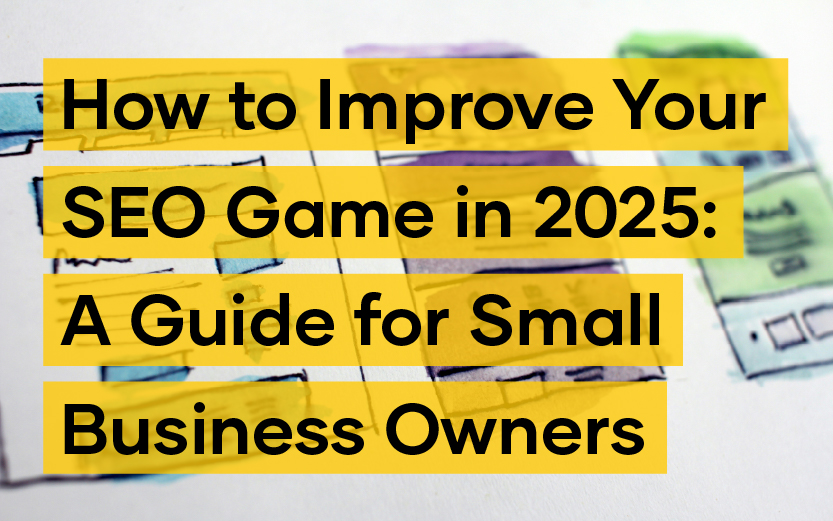SEO, SEO, SEO! We keep saying it, but what does it actually mean for your small business in 2025? Don’t worry—if the thought of “site speed” or “metadata” makes you want to hide under your desk, you’re not alone. In fact, you’re in good company. So, let’s break it down in simple, human terms—with a dash of humour and no scary tech jargon. Ready? Let’s go!
1. Understand the New Search Landscape
It’s not just Google anymore, folks. Customers are searching everywhere: Instagram, Amazon, and even AI tools like ChatGPT. To illustrate, Google now handles just 18% of all searches (gasp!). The rest? Well, it’s spread across a growing number of platforms.
Action Step: Think beyond Google. Are your products on Amazon? Is your Instagram bio snappy and keyword-packed? Make sure you’re showing up where your customers are looking.
Pro Tip: Start small. Don’t try to conquer every platform overnight. Instead, pick one or two (like Instagram and Google My Business) and focus your efforts there first.

2. Master the SEO Basics
Before diving into fancy AI tools or voice search, let’s ensure your website isn’t scaring people away. Think of SEO as the foundation of your online house: if it’s wobbly, nothing else will stand tall.
Key Focus Areas:
- Site Speed: A slow website is like a grumpy waiter—people leave before the main course arrives. Test your site’s speed with Google PageSpeed Insights and follow the advice it gives (don’t worry, it’s not as complicated as it sounds).
- Fix Broken Links: Ever clicked a link that led nowhere? Annoying, right? Make sure all your links work like they should.
- Update Content: Outdated content is like wearing 2010 skinny jeans in 2025—it’s just not going to work. Keep your content fresh and relevant.
Cheat Sheet:
- Is your website mobile-friendly? (People love their phones!)
- Are your blog posts still accurate? (No one wants to read about “marketing trends for 2020.”)
3. Don’t Fear the New Platforms
Okay, we’ve mentioned AI tools like ChatGPT and platforms like Bing. Before you panic: you don’t need a degree in computer science to make this work. These platforms are just new ways people search for answers—and you can totally handle it.
Action Step: Submit your site to Bing Webmaster Tools. Why Bing? Because it powers tools like ChatGPT, which means optimising for Bing can help you show up in AI-driven search results.
Bonus Tip: Create content that’s short and sweet. AI loves bite-sized, no-fluff information.
4. Create Content People Actually Want
We’ve all heard it: “Content is king.” However, let’s be honest, not all kings are created equal. Some are boring. Others are irrelevant. Your job? Be the fun, helpful kind of king.
Ideas That Work:
- Write blog posts that answer specific questions (e.g., “What’s the best coffee grinder for beginners?”).
- Use visuals: videos, infographics, or anything that’ll grab attention.
- Keep it short when you can. A 500-word article that’s packed with value beats a 2,000-word snooze-fest.
Pro Tip: Imagine you’re chatting with a customer. Write like that. Keep it simple, helpful, and a little fun.
5. Get SEO Local (and Love It)
If you have a physical shop, local SEO is your best mate. Think of it as putting a big “We’re here!” sign on the internet.
Quick Wins:
- Claim your Google My Business profile. (It’s free and takes 10 minutes.)
- Make sure your name, address, and phone number (NAP) are consistent everywhere.
- Ask your happy customers for reviews. They build trust and make you look fabulous online.
6. Embrace Visual and Voice Search for SEO
Ever used Google Lens to identify a plant? Or asked Siri, “Where’s the best pizza near me?” Welcome to the world of visual and voice search. It’s growing fast, and your business should get in on the action.
Action Steps:
- Add descriptive captions to your images (think: “handmade ceramic vase” instead of “IMG_1234.jpg”).
- Optimise for voice search by including natural, conversational phrases in your content.
Example: Instead of “Best pizza Sydney,” try “Where can I find the best pizza in Sydney?”
7. Let AI Be Your SEO Friend
AI tools like ChatGPT aren’t just for tech geeks—in fact, they can actually help your small business shine online. Moreover, AI-driven search engines prioritise clear, structured content, so let’s make that happen.
Action Steps:
- First, use headings and subheadings to organise your content (just like this article!).
- Next, add bullet points to make it scannable.
- Finally, use schema markup (okay, this sounds scary, but it’s basically a way to tell search engines what your content is about—your web developer can help).
8. Build Engagement (a.k.a. Chat With Your Audience)
Search engines love websites that people interact with. Not only that, guess what? So do people!
Ways to Engage:
- First, encourage reviews, testimonials, and user-generated content.
- Additionally, reply to comments and questions on your website and social media.
- Finally, update your FAQ page with real questions from your customers.
Fun Idea: Run a poll or quiz on Instagram. Not only is it engaging, but it also gives you valuable insights into what your audience wants.
Conclusion: Let’s Demystify SEO Together
SEO doesn’t have to be overwhelming. Think of it as a set of simple, practical steps to help your business show up where it matters. Start small, track your progress, and keep adapting. (And hey, if all else fails, call in the pros—we’re here to help!)
Remember: it’s not about being perfect. It’s about showing up and giving your customers what they need. You’ve got this!
To discover more marketing strategies, make sure you join us at the next Marketing Ecosystem Workshop to map out your one-page marketing plan. Here is the link to register (no cost!): https://www.basicbananas.com/virtualsummit/
Or apply to join the popular Clever Bunch program to accelerate your business growth. https://www.basicbananas.com/cleverbunch/
Here’s to creating ripple effects of brilliance everywhere we go!
The Basic Bananas Team
